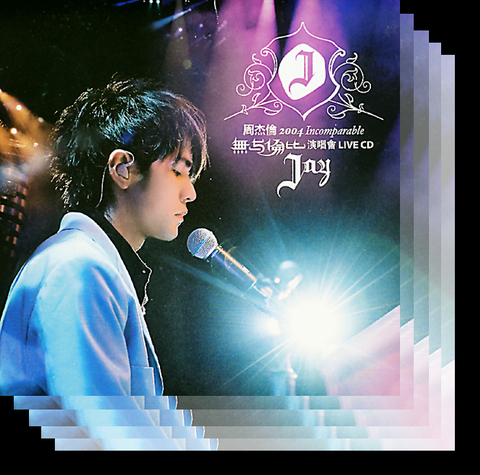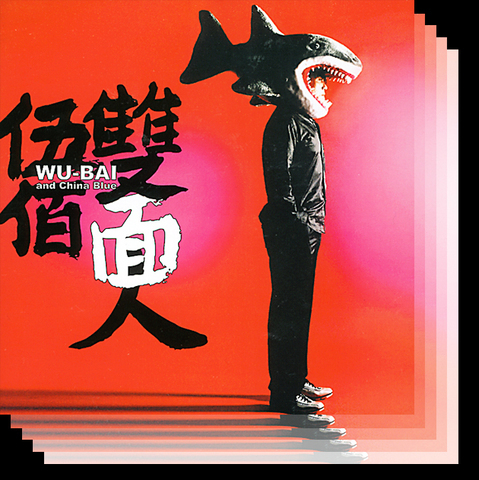Fans of Taiwan's number-one musical son longing to relive the action of Jay Chou (
The double-CD package features a selection of tunes recorded on that balmy autumn night. Chou warbles, croons and, of course, mumbles his way through 25 numbers that range in pace and style from slow, hypnotic Mando-rap numbers such as My Construction Site (

The recording has quite obviously been re-mastered and any and all bloopers and duff notes have been erased, which gives Incomparable Live 2004 more of studio recording-like live effect rather than a raw one.

Not that this spoils the fun, however. Fans can still close their eyes and imagine they were there, as Warner's studio engineers made the wise decision not to omit Chou's between-song banter. It might not be complete and it is cut short in parts, but you've got to hand it to Warner for adding a personal feel that all too many local live albums lack.
And if all that isn't enough to satisfy one's cravings for Chou, then those looking for more can purchase the special Incomparable Live 2004 CD set that comes complete with a VCD featuring music videos for Common Jasmine Orange as well as a glossy poster of the wonder boy himself.

Never able to stand still and gestate musically, Wu Bai (

Veering away from the tried-and-tested rock/blues format, Wu Bai has set out to capture the hearts and minds of the electonica/dance crowd with his latest mixed bag of material.
Packed with loops, edits and a host of dance music-like effects, it might sound as if the grand-old-man of Taiwan alt-rock has forsaken his roots. Scratch just under the surface of the tunes, however, and you'll find a host of well-produced, well-executed guitar-driven rock numbers.
The album's opener, Li Hai (
There are a couple more standard Wu Bai ballads thrown in for good measure, but for the most part Two Faced Man is an electronica/rock crossover album.
The material may be far removed from anything Wu Bai and China Blue have ever previously attempted, but the album is, without a doubt, an exciting and original piece of work from one of Taiwan's best musicians.
Over the past 15 years, award winning actress and songstress Wan Fang (萬芳) has released 17 solo albums, appeared on countless compilations and amassed a whopping library of tunes.
While wading through these recordings must surely have given the compilers at Rock Records a real headache,they have still managed to do a pretty good job of bringing out the best in Wan Fang.
The album is concise and expertly plots the singer's highs and lows, luckily with a greater emphasis on the former rather than the latter. The double-CD set contains nearly all of Wan Fang's Top-10 hits and proves that time has been kind to Wan Fang's brand of Mando-pop. Regardless of whether Wan Fang is in soulful or standard mature bubblegum Mando-pop mode, there's not one duff tune on the CD, which places her in the top of the Mando-pop acts.
Sure, you might not find her vocal prowess as sexy or sultry as that of other female acts, but Wan Fang remains one of the few songstresses in Taiwan who can hold a tune and, more importantly, who writes her own material.
The Great Leap Forward 2005 (
Rumored to be the first part of a trilogy of albums that will see Tao exploring "new and exciting musical directions," some of the tunes are a far cry from his more mainstream studio releases such as 2002's hit Black Tangerine (
To create his new sound, Tao has teamed up with a host of performers, songwriters and studio gurus including leggy classical crossover female ensemble 12 Girls Band (
The result of these musical couplings has enabled Tao to mix and match various contrasting musical genres. None of the album's 13 tunes follow the same musical path and, while there's still an underlying R&B/soul feel to many of the numbers, the creative collaborations have paid dividends.
Tao successfully blends rock, R&B and Mando-pop basics with elements of classical Beijing Opera and electronica. Tracks like the weird and wonderful opener Ghost Overture (
The highlight of the album, however, is the marvelous piece of 70s glam-rock, Sula & Lampa (Sula

Following the shock complete failure of all the recall votes against Chinese Nationalist Party (KMT) lawmakers on July 26, pan-blue supporters and the Chinese Communist Party (CCP) were giddy with victory. A notable exception was KMT Chairman Eric Chu (朱立倫), who knew better. At a press conference on July 29, he bowed deeply in gratitude to the voters and said the recalls were “not about which party won or lost, but were a great victory for the Taiwanese voters.” The entire recall process was a disaster for both the KMT and the Democratic Progressive Party (DPP). The only bright spot for

Water management is one of the most powerful forces shaping modern Taiwan’s landscapes and politics. Many of Taiwan’s township and county boundaries are defined by watersheds. The current course of the mighty Jhuoshuei River (濁水溪) was largely established by Japanese embankment building during the 1918-1923 period. Taoyuan is dotted with ponds constructed by settlers from China during the Qing period. Countless local civic actions have been driven by opposition to water projects. Last week something like 2,600mm of rain fell on southern Taiwan in seven days, peaking at over 2,800mm in Duona (多納) in Kaohsiung’s Maolin District (茂林), according to

Aug. 11 to Aug. 17 Those who never heard of architect Hsiu Tse-lan (修澤蘭) must have seen her work — on the reverse of the NT$100 bill is the Yangmingshan Zhongshan Hall (陽明山中山樓). Then-president Chiang Kai-shek (蔣介石) reportedly hand-picked her for the job and gave her just 13 months to complete it in time for the centennial of Republic of China founder Sun Yat-sen’s birth on Nov. 12, 1966. Another landmark project is Garden City (花園新城) in New Taipei City’s Sindian District (新店) — Taiwan’s first mountainside planned community, which Hsiu initiated in 1968. She was involved in every stage, from selecting

As last month dawned, the Democratic Progressive Party (DPP) was in a good position. The recall campaigns had strong momentum, polling showed many Chinese Nationalist Party (KMT) lawmakers at risk of recall and even the KMT was bracing for losing seats while facing a tsunami of voter fraud investigations. Polling pointed to some of the recalls being a lock for victory. Though in most districts the majority was against recalling their lawmaker, among voters “definitely” planning to vote, there were double-digit margins in favor of recall in at least five districts, with three districts near or above 20 percent in